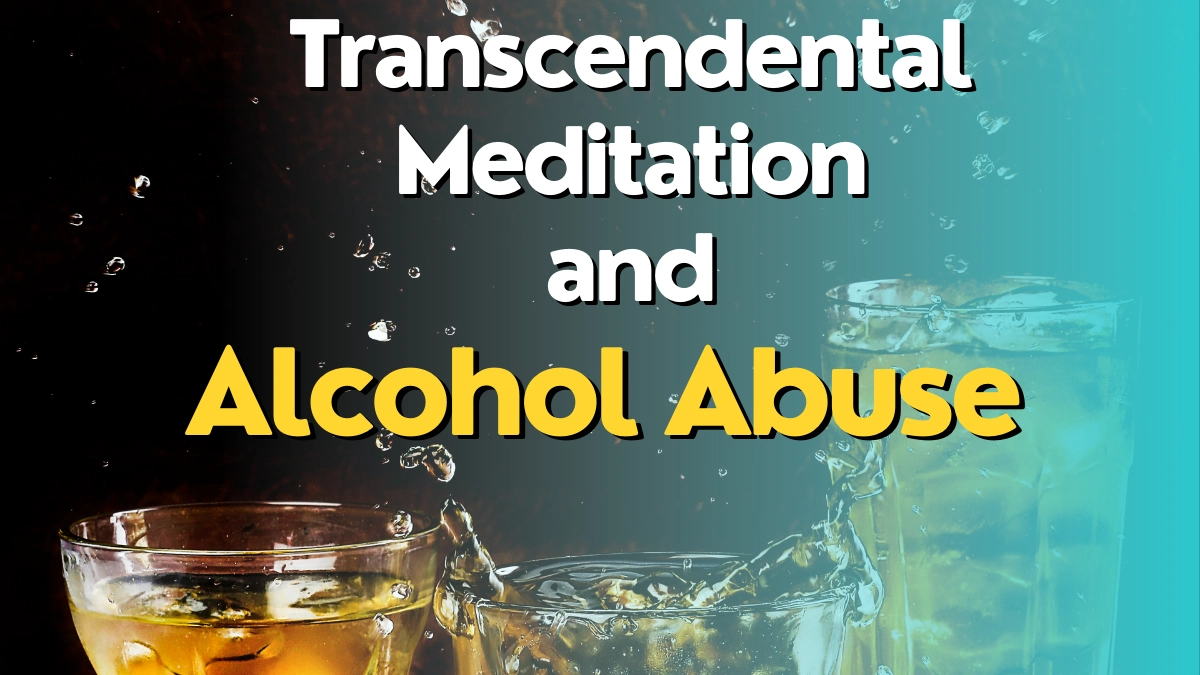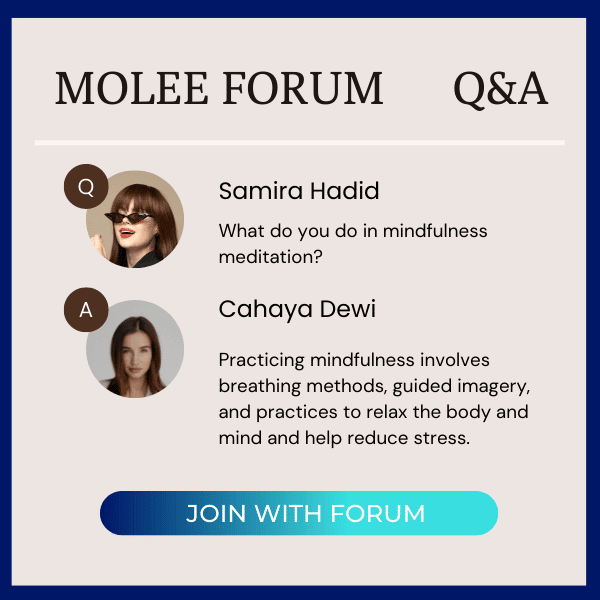Table of Contents
- Alcohol Abuse
- Transcendental Meditation
- Impact of Transcendental Meditation on Alcohol Use Disorder
- Women and Alcoholism
- Research Evidence on Transcendental Meditation and Alcohol Abuse
- Transcendental Meditation as a Supportive Therapy
- Comparison of TM with Other Meditation Techniques for Dealing with Alcohol
- Final Thoughts
- FAQs on Transcendental Meditation and Alcohol Abuse
Have you ever wondered if meditation could help someone stop drinking too much alcohol?
Today, let’s explore how a type of meditation called “transcendental meditation” might be linked to helping people who have trouble drinking too much.
We’ll talk about transcendental meditation and alcohol abuse why some folks find it hard to stop drinking and how this meditation could be part of the solution.
Come along as we learn how this meditation practice might bring hope and healing to those struggling with alcohol issues with science-backed results.
Alcohol Abuse
Excessive alcohol consumption continues to be a widespread problem globally, causing significant and varied effects on people, their families, and communities alike.
Defined as the excessive consumption of alcohol, often resulting in detrimental effects on physical health, mental well-being, and social relationships, alcohol abuse stands as a significant public health concern.

Alcohol abuse is a complex condition characterized by the compulsive use of alcohol despite negative consequences. It encompasses a spectrum of unhealthy alcohol-drinking behaviors, including alcohol dependence, heavy drinking, and binge drinking.
Read our full article on Transcendental meditation and addiction recovery from here.
Alcohol is a Trap
Excessive alcohol consumption can create a cycle of dependence, making alcohol a trap that individuals may find difficult to escape from. The promise of temporary relief from stress can lead to increased tolerance and a need for more alcohol to achieve the same effects.
Signs That You Drink Too Much
Common signs of excessive drinking include:
- Inability to limit drinking
- Prioritizing alcohol over other activities
- Experiencing withdrawal symptoms such as shaking, nausea, anxiety, or insomnia without alcohol
- Engaging in risky behaviors while drinking
- Neglecting responsibilities at your work, school, or home
These signs indicate a developing or established pattern of alcohol abuse.
Does alcohol reduce happiness or make you happier?
Drinking may offer temporary euphoria or relaxation, but chronic use often leads to decreased overall happiness due to negative health and social consequences. Long-term drug abuse can significantly impact mental health and lead to a decreased quality of life.
Causes for Alcohol Abuse
Causes for alcohol abuse can include:
- Genetics and Family History: Genetic predispositions and family history of alcoholism or substance abuse can increase the likelihood of alcohol abuse in individuals.
- Social and Peer Pressure: Influences from social circles, peer pressure, or societal norms that encourage heavy drinking or normalize alcohol use can contribute to alcohol abuse.
- Mental Health Conditions: Conditions such as depression, anxiety, trauma, or stress can lead individuals to self-medicate using alcohol, resulting in abuse or dependency.
- Environmental Factors: Living in an environment where alcohol is readily available, affordable, and socially acceptable can increase the risk of alcohol abuse.
- Traumatic Experiences: Past traumas, including physical, emotional, or psychological abuse, can sometimes lead individuals to turn to alcohol as a coping mechanism.
- Stress and Coping Mechanisms: Stressful life events, major life changes, or an inability to cope with life’s challenges can drive some individuals towards alcohol abuse as a means of escape or relief.
- Underlying Psychological Factors: Low self-esteem, feelings of inadequacy, or a lack of purpose in life may contribute to alcohol abuse as individuals seek comfort or distraction.
- Lack of Education and Awareness: Insufficient knowledge about the risks associated with alcohol abuse or a lack of awareness about healthy drinking habits can lead to problematic consumption.
These factors can be a risk factor for developing alcohol addiction.
Effects of Alcohol Abuse
Alcohol abuse can lead to a range of detrimental effects such as:
- Contribute to developing physical health problems such as liver disease, pancreatitis, cardiovascular issues, gastrointestinal problems, and an increased risk of certain cancers.
- Lead to mental health conditions like depression, anxiety disorders, increased aggression, memory problems, and cognitive impairment.
- Results in strained relationships with family, friends, and colleagues due to erratic behavior, arguments, or neglect of responsibilities.
- Decrease job performance, absenteeism, and job loss.
- Face financial difficulties due to spending money on alcohol or related legal issues.
Chronic abuse significantly increases the risk of these outcomes.
National Institute on Alcohol Abuse and Alcoholism
The National Institute on Alcohol Abuse and Alcoholism (NIAAA) provides resources and information aimed at understanding and treating alcohol-related disorders. It serves as a valuable repository for research and educational materials on the topic of substance abuse.
According to NIAAA, alcohol is the most commonly used substance in the US. Here are facts and numbers extracted from the NIAAA website for your knowledge.
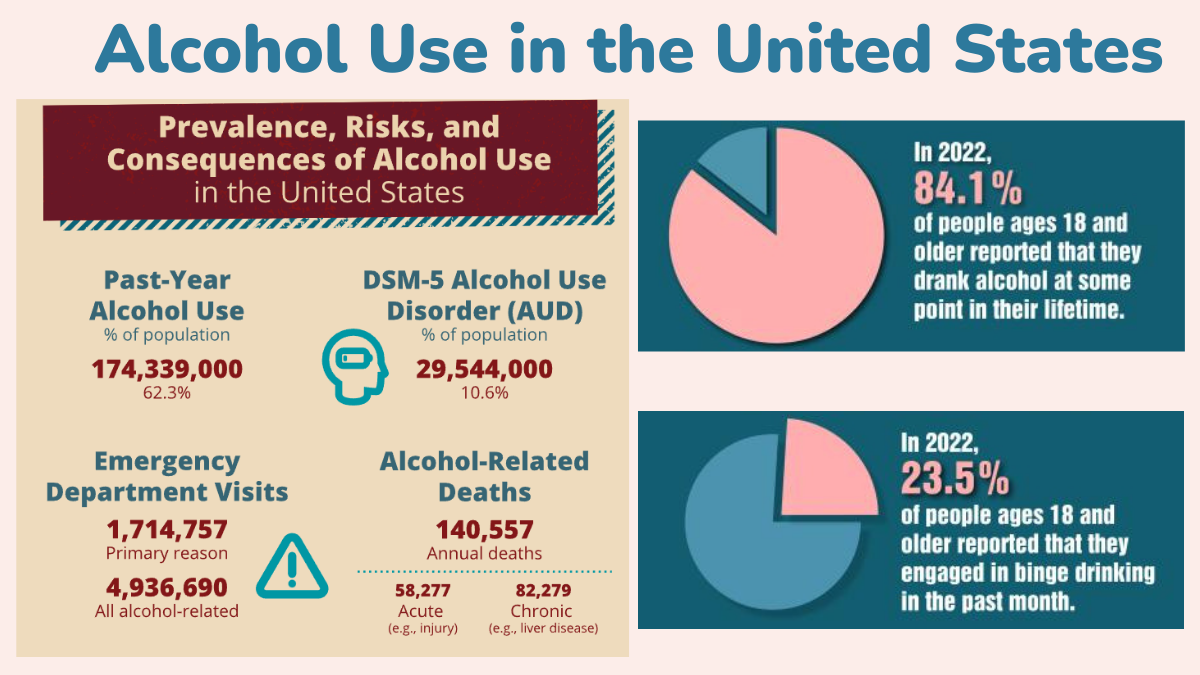
- 84.1% of adults in the US have consumed it at least once in their lives.
- 69.5% of adults reported drinking alcohol in the past year, and 54.9% drank within the past month.
- 23.5% of adults aged 18 and above engaged in binge drinking in the past month, with 29.7% of men and 22.2% of women involved.
- 6.3% of adults were heavy alcohol users in the past month (8.3% men and 4.5% women)
- Those who are engaging in high-intensity drinking are 70% more likely to visit the Emergency Room for alcohol-related issues.
Transcendental Meditation
Transcendental Meditation (TM) is a form of silent mantra meditation developed by Maharishi Mahesh Yogi. It is practiced for 20 minutes twice per day while sitting comfortably with the eyes closed. The technique is said to allow the individual’s mind to effortlessly enter a state of deep relaxation, which can lead to increased mental clarity and reduced stress.
Impact of Transcendental Meditation on Alcohol Use Disorder
Alcohol Use Disorder (AUD) refers to a chronic condition where individuals struggle with problematic alcohol consumption, causing distress or impairment in their daily functioning.
The Transcendental Meditation Program has garnered attention for its potential benefits in the treatment of alcohol use disorders (AUD). TM is a mind-body technique that may help with the management of stress, self-control, neurological health, and emotional stability, all of which are crucial in combating alcohol abuse.
Reduction of Stress
TM practices have been shown to reduce stress, one of the significant factors in alcohol dependence. Studies suggest that individuals who incorporated meditation practices into their recovery process experienced lower stress levels. Reduced stress is directly linked to decreased alcohol cravings, providing a more favorable environment for recovery.

Enhancement of Self-Control
Regular meditation practice can lead to an enhancement of self-control. The technique facilitates a state of relaxed awareness, which can help individuals in the decision-making process, making it easier for them to resist the impulse to consume alcohol. The ability to exercise self-control is essential for managing AUD effectively.
Neurological Benefits
TM has notable neurological benefits. These benefits include changes in brain function related to addiction patterns. Individuals may find a decreased physiological response to stress and a reduced likelihood of resorting to alcohol as a coping mechanism.
Emotional Stability
Finally, Transcendental Meditation can contribute to improved emotional stability. Those suffering from AUD often experience intense emotional fluctuations. This helps in achieving a calmer, more stable emotional state, which is beneficial for individuals struggling with the emotional volatility that can accompany alcohol withdrawal and recovery.
Transcendental Meditation, when integrated into treatment for AUD, has been associated with promising outcomes as it addresses critical areas of stress reduction, self-control, neurological functioning, and emotional regulation that are often compromised by alcohol misuse.
Women and Alcoholism
Alcoholism has been recognized as a significant health concern among women, which presents unique challenges and health risks distinct from those faced by men.

How Alcoholism Affects Women Particularly
Research indicates that women metabolize alcohol differently than men, leading to faster intoxication and greater susceptibility to alcohol’s toxic effects. Data show that even with less consumption, women are at a higher risk for liver damage, brain abnormalities, and heart disease. The progression from initial use to dependence is often more rapid in women, a phenomenon known as “telescoping.”
Women’s Related Disease by Consuming Alcohol
- Liver Disease: Women are more prone to alcoholic liver disease, such as hepatitis and cirrhosis, despite typically drinking less over a lifetime than men.
- Cancers: There is a higher association between alcohol consumption in women and the development of breast cancer, as well as other forms such as liver and esophageal cancers.
- Heart Disease: Alcohol abuse in women contributes to a greater likelihood of heart-related issues, including an increased risk of heart attack and stroke.
- Pregnancy: Alcohol use during pregnancy can cause fetal alcohol spectrum disorders (FASDs), with lifelong impacts on the child.
Research Evidence on Transcendental Meditation and Alcohol Abuse
The correlation between Transcendental Meditationand its impact on individuals with alcohol use disorder (AUD) is substantiated by clinical research and data analysis. Studies indicate that meditation practices can be implemented effectively during AUD treatment and may foster improved outcomes.
1. Effects of the Transcendental Meditation Program on Substance Use among University Students
Study Population: 295 university students participated in a randomized wait-list controlled trial examining the effects of the Transcendental Meditation program in an urban setting.
Assessment: Self-reported substance use was evaluated at baseline and after 3 months.
Results – Smoking and Illicit Drug Use: No significant differences were observed between the conditions (TM instruction and control) concerning smoking or illicit drug use.
Results – Alcohol Use: Significant interactions were found based on gender and intervention condition. Transcendental Meditation lowered drinking rates among male students but not among female students.
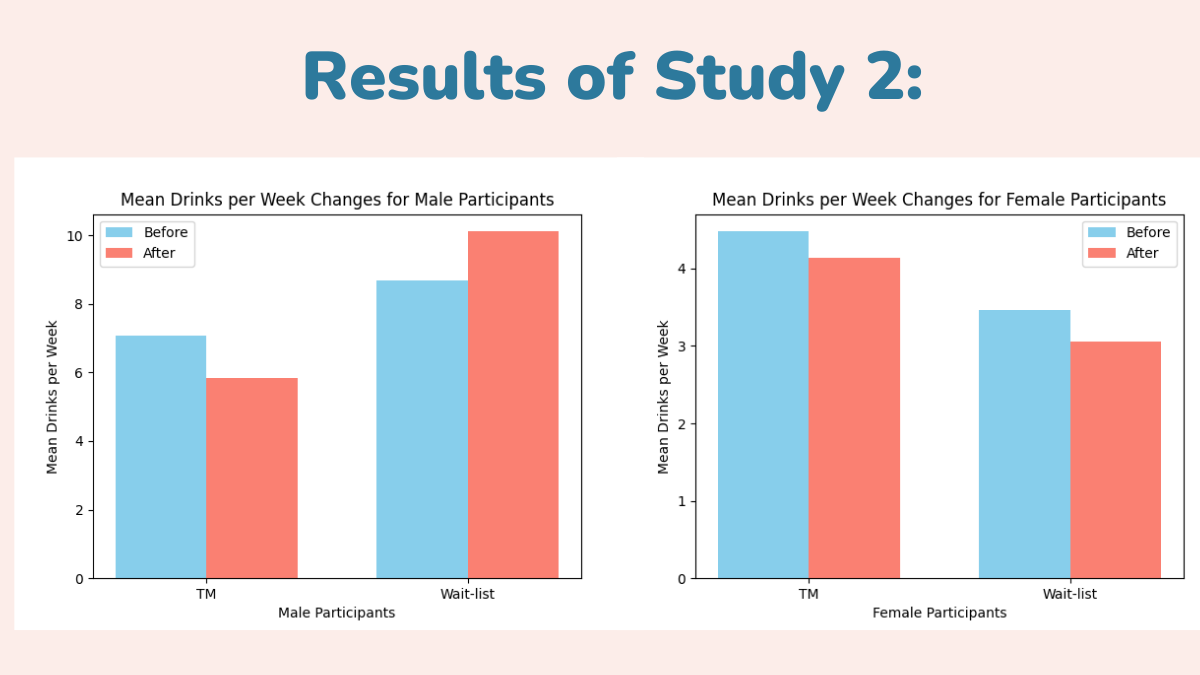
Potential Impact: TM instruction could potentially play a beneficial role in reducing alcohol consumption specifically among male university students.
2. Integration of Transcendental Meditation® (TM) into alcohol use disorder (AUD) treatment
Study Aims: The study aimed to explore the feasibility and potential outcomes of incorporating Transcendental Meditation (TM) into the treatment of Alcohol Use Disorder (AUD). Specifically, it sought to assess the viability of providing TM during AUD treatment, compare outcomes between TM and Treatment as Usual (TAU), and investigate the relationship between TM practice and treatment results.
Study Population: The study recruited meditation-naïve adults diagnosed with primary AUD (N = 60; 35% female, 60% white) who were newly admitted to inpatient treatment. They were split into sequential cohorts, with 30 receiving TAU and 30 receiving TM training.
Results – Feasibility and Uptake: Integrating TM into inpatient AUD treatment was feasible, with high uptake (85% meditating most days in the past 30; 61% adherent to the recommended twice-daily TM practice). Participants expressed high satisfaction with TM.
Overall Treatment Outcomes: The entire sample showed improvement on multiple measures post-AUD treatment. However, there were no significant differences observed between TM and TAU cohorts.
Impact of Regular TM Practice: Those who consistently practiced TM as recommended showed more positive outcomes. They were less likely to return to any drinking (25% vs. 59%) or heavy drinking (0% vs. 47%) post-discharge.
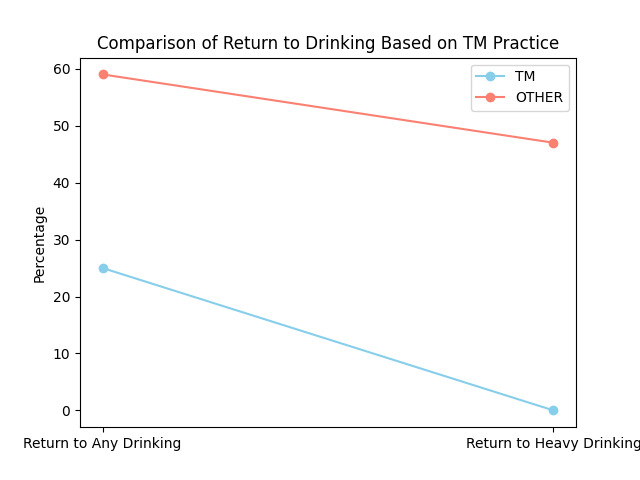
Relationship between TM Practice and Outcomes: Higher regularity in TM practice correlated with reduced stress, psychological distress, craving, and alcohol use at follow-up.
References:
1. Haaga DA, Grosswald S, Gaylord-King C, Rainforth M, Tanner M, Travis F, Nidich S, Schneider RH. Effects of the Transcendental Meditation Program on Substance Use among University Students. Cardiol Res Pract. 2011 Mar 21;2011:537101. doi: 10.4061/2011/537101. PMID: 21559213; PMCID: PMC3087968.
2. Gryczynski J, Schwartz RP, Fishman MJ, Nordeck CD, Grant J, Nidich S, Rothenberg S, O’Grady KE. Integration of Transcendental Meditation® (TM) into alcohol use disorder (AUD) treatment. J Subst Abuse Treat. 2018 Apr;87:23-30. doi: 10.1016/j.jsat.2018.01.009. Epub 2018 Jan 16. PMID: 29471923.
Finally, clinical studies reveal that integrating TM into AUD treatment is not only feasible but also potentially beneficial. Researchers have examined the effects of TM, highlighting its role in reducing stress and providing a supportive technique during recovery from alcohol abuse.
Transcendental Meditation as a Supportive Therapy
The effects of Transcendental Meditation are increasingly recognized for their potential benefits as a supportive therapy in the treatment of alcohol use disorder (AUD). This practice can complement traditional treatments, helping patients to manage stress and potentially reduce the risk of relapse.

Integration in Rehabilitation Programs
Studies have shown that the integration of TM into inpatient AUD treatment is not only feasible but also met with high uptake rates. 85% of participants continued to practice TM on most days even after three months post-discharge. Additionally, 61% were closely adherent to the recommended practice of twice-daily sessions, which indicates a strong potential for TM to be a sustainable component of AUD recovery strategies.
Complementary to Traditional Treatments
TM appears to serve well as a complement to traditional AUD treatments. Participants in these programs often report high satisfaction with TM, suggesting that it may improve their overall treatment experience and engagement. The practice of TM can lead to improvements in multiple metrics of well-being, signifying its role as a beneficial adjunctive therapy. By potentially reducing stress, a known trigger for substance use, TM can be a valuable tool in the arsenal of treatments aimed at combating AUD.
Comparison of TM with Other Meditation Techniques for Dealing with Alcohol
This section examines how different meditation practices, including Transcendental Meditation (TM), address alcohol use disorder (AUD) and interact with alcohol consumption.

How Can Meditate Help With Alcohol Use Disorder?
Meditation, such as Transcendental Meditation, has been integrated into treatments for AUD due to its potential for reducing stress and anxiety—factors that often contribute to alcohol misuse. Studies suggest TM might improve self-regulation, which is crucial for individuals managing AUD.
Can alcohol interfere with meditation?
Alcohol consumption can disrupt cognitive functions and alter consciousness levels, which may negatively impact the ability to achieve the focused attention required in many forms of meditation. For those practicing TM, which aims for a state of pure consciousness, alcohol could be particularly hindering.
Why do yogis not drink alcohol?
Many yogis abstain from alcohol to maintain the purity of the body and mind, which they see as essential for advancing their practice. Since alcohol can impair judgment and hinder spiritual growth, it is often avoided by practitioners seeking the higher states of consciousness promoted by the transcendental meditation technique.
Can you be mindful and drink alcohol?
While mindfulness involves being fully present and conscious of one’s experiences, alcohol impairs this ability. However, some mindfulness programs acknowledge that total abstinence may not be realistic for everyone and thus focus on bringing mindful awareness to all activities, including conscious drinking.
Is alcohol bad karma?
In many spiritual traditions, actions like consuming alcohol, which can cloud judgment and lead to harmful behavior, may be considered to generate negative karma. Practices such as TM encourage clarity and purity of consciousness, suggesting that engaging in activities that produce a fog of awareness, such as excessive alcohol consumption, could be seen as contributing to bad karma.
Read our article on TM and diabetes relief here.
Final Thoughts
This blog post presents compelling insights into the synergy between transcendental meditation and alcohol abuse. With scientific studies as foundational evidence, it showcases how the TM program could serve as a valuable tool in addressing the complexities of alcohol misuse, paving the way for holistic approaches to wellness.
FAQs on Transcendental Meditation and Alcohol Abuse
What are the effects of alcohol syndrome?
Alcohol syndrome refers to the range of physical, mental, and behavioral issues that arise in individuals exposed to alcohol in the womb, causing developmental problems in babies.
How does Transcendental Meditation impact individuals?
Transcendental Meditation has shown positive effects on mental health, reducing stress, anxiety, and depression, while promoting overall well-being and enhancing cognitive function.
Can Transcendental Meditation help in treating alcoholism?
Studies suggest that incorporating Transcendental Meditation into treatment plans may aid in reducing alcohol intake by managing stress and fostering a sense of inner calm, contributing to a holistic approach to recovery.
What constitutes excessive alcohol intake?
Excessive alcohol intake involves consuming more than the recommended limits, leading to various health issues, including liver damage, addiction, and increased risk of accidents or injuries.


